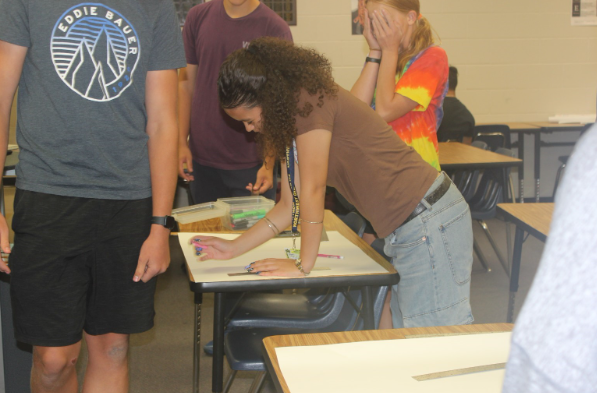All about that education

There are 24 hours in the day, at least seven required to spend at school, and, according to scientists, nine hours of sleep are required for teenage brains. If you’re in sports, extracurriculars, have a job, or just need to keep up the social aspects of your life, that’d leave you with eight hours to spend on those activities, before you’d be required to cut into your sleep.
For Alyssa Hershey, time can appear crunched at times, and on some days, it’s a matter of choosing.
Hershey is involved in several things, both in and out of school. Being involved in several shows at Music Theater for Young People (MTYP), Music Theater Wichita (MTW) and Wichita Children’s Theater & dance Center (WTC & DC) on top of school, higher level classes, church, band and even dance classes has lead to her having a jam-packed schedule.
“It just kinda depends on what’s going on,” Hershey said, “Like how much is going on at that point. Right now, I’m handling it pretty well. A couple weeks ago, though, I was at a breaking point. AP classes, and end of the nine weeks, and being in two shows– it can just– it can get really tough.”
The current D and F list policies doesn’t affect Hershey due to her lack of participation in school sports, however her grades and extracurriculars such as: band, symphony, two dance classes, church Wednesday and Sunday, plus three advanced courses, can often lead her to having to make hard decisions and sacrificing things to find that balance. A few weeks back she had several shows and events packed into her short week, and found herself on the edge constantly.
“I wasn’t really sleeping that much, there was a few days in there where I didn’t sleep at all. It was really healthy,” Hershey said, “There were two nights where I pulled two all nighters in a row and I was just always doing something. Right after school I’d be in rehearsals until late and then I’d go straight home and do homework and just eat on the way. Then I’d be up all night doing homework and the next day I’d be doing it all over again. There was a couple times where I almost had a meltdown.”
Although Hershey doesn’t have to worry about not being able to perform if her grades dip down into the lower levels, not all students are as lucky. Business teacher Jeff Darr believes that it’s all a matter of finding a balance, which can be hard with all the things offered at Northwest, and even more so after they added an extra hour a couple years ago.
“There is a point that we need to, as administrators and teachers, I think we need to at least look at the number of classes that we changed two years ago. we went from seven periods to eight periods in terms of classes that students could potentially have projects, homeworks, tests, and things of that nature.”
Principle Alverez believes the D and F list is a good change for Northwest and thinks it should be seen as a positive thing. He wants it to be something to keep students, and teachers aware and seeking help if they need it.
“I think the D and f list was meant to be more of an awareness, not a punishment. The list came about because our athletic teams wanted to have a code of conduct that was tied into the d and f list that tied into the students grades. You had to have several ds and fs before you had your first warning week and after that week if it didn’t come up then there were consequences rather it be no playing time or what not. I think everybody thought that you could only have one D or F but that’s not the case, the case is we’re trying to get students into torturing, in to see their teacher– We’re trying to make it student friendly and not just a complete punishment.”
Junior Taylor Webber counters.
“Basically it comes down to you can not have a social life, good grades, play a sport, have a job, and get sleep. It’s impossible. How am I supposed to do my homework if I only get two hours of sleep? “




